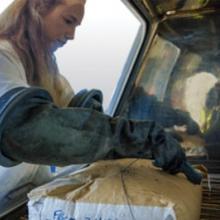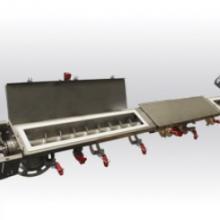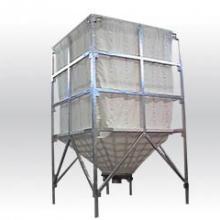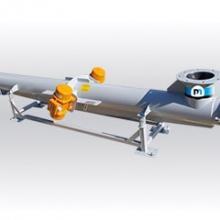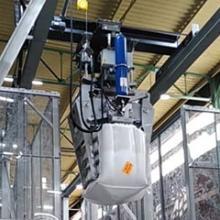Processed powders: lactose, permeate, various milk powders
Automation of powder transfer and dosing in the dairy industry
Context
As part of modernising its production lines, a dairy processing company sought to implement an automated system for handling food powders, particularly lactose and other dry ingredients.
The key challenges were ensuring accurate batch dosing into liquid process tanks, improving hygiene in production areas, and complying with ATEX zoning requirements. Additionally, the goal was to reduce physical strain on operators and secure powder transfers within a food-grade environment.
The installation had to offer flexible integration into existing buildings while allowing multi-ingredient management via separate feed streams.
Implemented solution
To meet the client’s requirements, a complete powder handling line was designed, incorporating dense phase pneumatic conveying and flexible gravity-fed silos.
The main flow begins with a big bag unloading station equipped with an electric hoist. Powders are conveyed pneumatically to a flexible silo mounted on load cells. This silo enables batch preparation before feeding into a powder incorporator, via a vibrating feeder fitted with a moisture-backflow barrier.
The closed-loop pneumatic transfer ensures contactless conveying, significantly reducing risks of cross-contamination, segregation or clogging.
Benefits of the installation
-
Accurate dosing: Reliable batch control
The system includes flexible silos mounted on load cells for precise batch management. In combination with screw feeder regulation and level sensors, the system ensures controlled material delivery with a dosing tolerance typically below ±1%, which is essential for sensitive formulations such as dairy powders or additives.
-
Enhanced hygiene: Open and cleanable design
All equipment features smooth surfaces, removable access hatches and retention-free zones. The textile silos, in particular, prevent product build-up, inhibit bacterial growth, and facilitate manual or automated cleaning. This hygienic design complies with strict food industry requirements.
-
Regulatory compliance: ATEX zoning and food-grade materials
All components in contact with the product are available in food-grade versions (stainless steel, FDA-compliant seals, antistatic tubing). The system can be configured to meet ATEX zone requirements (zones 20/21 or 22), thanks to certified equipment and systematic grounding of conductive parts.
-
Ergonomics: Assisted handling, safe access, ground-level operation
Big bag unloading stations are fitted with massaging cylinders, handling crosses and dust-tight connection heads. These elements allow operators to work without excessive physical effort while ensuring safe access to the discharge spout. Operator interfaces (control panels, remote buttons) are installed at optimal height to reduce the risk of musculoskeletal disorders (MSDs).
-
Flexibility: Multi-powder management via two separate streams
The dual-feed configuration (main big bag station + mixed big bag/manual sack station) allows different raw materials to be handled without production interruption. Both streams merge at a common dosing point, with automated switchover when required. This flexibility is ideal for multi-recipe production or short batch campaigns.
-
Space-saving: Compact design with flexible silos
Textile silos offer a lightweight and compact alternative to rigid steel silos. Their installation is straightforward, without heavy civil works, and they fit easily into constrained-height spaces. Their flexible structure also enables fast transport and on-site assembly.
-
Safe process: Closed pneumatic transfer reducing contamination risks
The dense phase pressure conveying system ensures hermetically sealed powder transport, with no contact with ambient air. This transfer method prevents segregation, dust emissions and moisture contamination, while reducing downstream dust extraction needs.
Industrial equipment used
Big bag discharging stations
These stations enable secure emptying of powder-filled big bags. Each includes:
- Electric hoist or handling cross
- Dust-tight connection head
- Vibrating plate to facilitate discharge
- Localised dust extraction system
- Optional: Pneumatic massaging device for poorly flowing powders
Function: Clean and ergonomic big bag discharge with optimal dust containment. Fully compatible with ATEX zoning and food safety standards.
Mixed big bag / manual sack station
A combined station for feeding either from big bags or manual sacks:
- Buffer hopper with access hatch for manual pouring
- Safety screen to remove foreign objects
- Integrated dust extraction ventilation
- Gas-spring-assisted lid or access cover
- Big bag connection with clamping ring or pinch tube
Function: Provides flexible product feed options for both small and bulk volumes. Ensures operator safety and dust control.
Flexible weighing silos
Gravity-fed storage systems in textile structure (polyester or Trevira), mounted on a frame with 4 load cells:
- Capacities from 500 to 30,000 L
- Conical outlet hopper with optional agitation
- Modular frame, easy to disassemble
- Antistatic, food-grade fabric
- Discharge tube connectable to screw or pneumatic conveyor
Function: Acts as buffer storage between material reception and dosing. Offers modularity, hygiene, and precise gravimetric control.
Screw conveyors (tubulor or trough)
For horizontal or inclined powder transfer:
- Lengths from 1 to 6 metres
- Motors from 0.55 to 2.2 kW, with optional variable speed drive
- Removable flanges, inspection hatch, purge zone
Function: Delivers accurate and reliable powder feed to the incorporator or process tank.
Additional process equipment
Powder incorporator
Designed for integrating powders into liquids in a homogeneous and safe way:
- Stainless steel mixing tank with integrated agitator
- Vortex system for fast dispersion
- Loading hopper with safety grid
- Closed-loop system with recirculation
- Optional: temperature probe, load cell, level sensor
Function: Ensures controlled incorporation of ingredients into the formulation tank. Guarantees lump-free dispersion and minimises airborne dust.
Dense phase pressure pneumatic conveying
A closed system for powder transfer using compressed air:
- Pressurised transfer vessel
- Sequenced injection valves
- Terminal filter with auto-cleaning system
- Flow rate regulation via PLC
Function: Hygienic, contamination-free transfer that preserves product characteristics. Ideal for fragile, abrasive or cohesive powders.
Vibrating feeder
Enables gravity-fed transfer of powders from silo to incorporator:
- Polished stainless steel surface
- Adjustable vibration intensity
- Inclined design for optimal flow
- Moisture-backflow prevention flap
Function: Provides smooth, consistent flow to the incorporator while maintaining powder integrity and preventing moisture ingress.
Conclusion
By deploying this fully automated handling and dosing line, the dairy manufacturer enhances its production performance and traceability while complying with the strictest hygiene, ergonomic and safety standards (ATEX, food-grade, operator safety).
This modular solution supports flexible recipe management and easy integration into existing facilities, a future-ready investment for modern dairy production.















